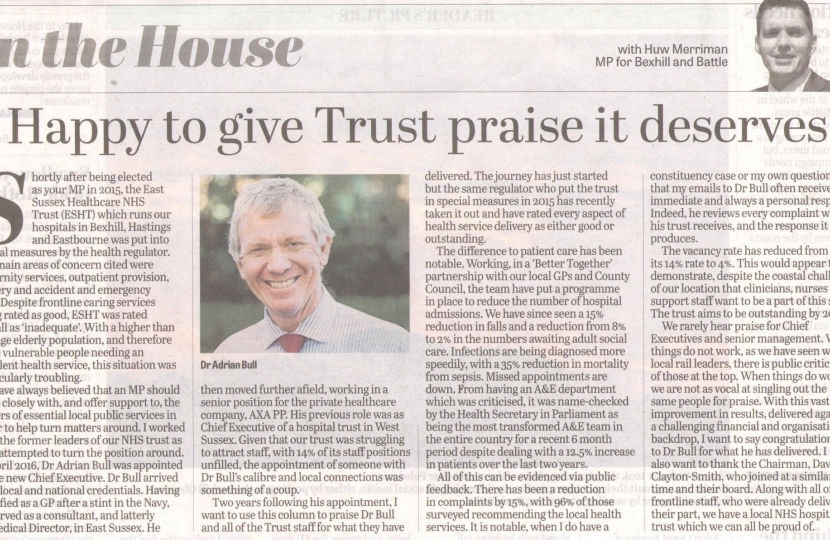
Shortly after being elected as your MP in 2015, the East Sussex Healthcare NHS Trust (ESHT) which runs our hospitals in Bexhill, Hastings and Eastbourne was put into special measures by the health regulator. The main areas of concern cited were maternity services, outpatient provision, surgery and accident and emergency care. Despite frontline caring services being rated as good, ESHT was rated overall as ‘inadequate’. With a higher than average elderly population, and therefore more vulnerable people needing an excellent health service, this situation was particularly troubling.
I have always believed that an MP should work closely with, and offer support to, the leaders of essential local public services in order to help turn matters around. I worked with the former leaders of our NHS trust as they attempted to turn the position around. In April 2016, Dr Adrian Bull was appointed as the new Chief Executive. Dr Bull arrived with local and national credentials. Having qualified as a GP after a stint in the Navy, he served as a consultant, and latterly as Medical Director, in East Sussex. He then moved further afield, working in a senior position for the private healthcare company, AXA PP. His previous role was as Chief Executive of a hospital trust in West Sussex. Given that our trust was struggling to attract staff, with 14% of its staff positions unfilled, the appointment of someone with Dr Bull’s calibre and local connections was something of a coup.
Two years following his appointment, I want to use this column to praise Dr Bull and all of the Trust staff for what they have delivered. The journey has just started but the same regulator who put the trust in special measures in 2015 has recently taken it out and have rated every aspect of health service delivery as either good or outstanding.
The difference to patient care has been notable. Working, in a ‘Better Together’ partnership with our local GPs and County Council, the team have put a programme in place to reduce the number of hospital admissions. We have since seen a 15% reduction in falls and a reduction from 8% to 2% in the numbers awaiting adult social care. Infections are being diagnosed more speedily, with a 35% reduction in mortality from sepsis. Missed appointments are down. From having an A&E department which was criticised, it was name-checked by the Health Secretary in Parliament as being the most transformed A&E team in the entire country for a recent 6 month period despite dealing with a 12.5% increase in patients over the last two years.
All of this can be evidenced via public feedback. There has been a reduction in complaints by 15%, with 96% of those surveyed recommending the local health services. It is notable, when I do have a constituency case or my own questions, that my emails to Dr Bull often receive an immediate and always a personal response. Indeed, he reviews every complaint which his trust receives, and the response it produces.
The vacancy rate has reduced from its 14% rate to 4%. This would appear to demonstrate, despite the coastal challenges of our location that clinicians, nurses and support staff want to be a part of this story. The trust aims to be outstanding by 2020.
We rarely hear praise for Chief Executives and senior management. When things do not work, as we have seen with local rail leaders, there is public criticism of those at the top. When things do work, we are not as vocal at singling out the same people for praise. With this vast improvement in results, delivered against a challenging financial and organisational backdrop, I want to say congratulations to Dr Bull for what he has delivered. I also want to thank the Chairman, David Clayton-Smith, who joined at a similar time and their board. Along with all of the frontline staff, who were already delivering their part, we have a local NHS hospital trust which we can all be proud of.


